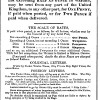
Susan Donovan, “How the Post Office and Postal Products Shaped Mid-Nineteenth-Century Letter-Writing”
In an age of electronic communication it is easy to forget the vital role that letter-writing played in people’s everyday lives in the nineteenth century. Critical attention has tended to focus more on the communicative function of letters than on what is often considered as the more mundane material aspects of letter exchange such as the postal service or the type of stationery used. This article explores the impact of mid-century postal reforms, improved transportation and new postal products on the letter-writing practice and epistolary relationships of Arthur Hugh Clough. My reasons for making Clough the central case study of this piece are two-fold: firstly, because of the large body of correspondence that exists between him and his American literary friends over the period of the mid-nineteenth century (c.1847-1861); and secondly, Clough’s interest in, and innovative use of the epistolary form in his poetry. The article underlines the significance of the postal revolution for Clough’s life and work, which can hardly be overstated. The greatly improved transatlantic mail service enabled him to keep in regular contact with his closest friends and publishers and to send them, over a period of several years, all the revisions and additions to his most important work: Amours de Voyage, published for the first time in the US in 1858; his acclaimed translation of Plutarch’s Lives (1859) and the definitive edition of his collected poems, published posthumously in the USA in 1862. The article also highlights instances where material circumstances—the curtailment of the transatlantic mail service, or lost and delayed letters—had an adverse effect on Clough’s correspondence and on his publishing projects. On this point, I draw parallels with Clough’s epistolary poetry—most notably Amours de Voyage—whose form and plot clearly illustrate the importance he attached to the medium of correspondence. The article also demonstrates Clough’s awareness of the role played by postal products in the construction of an “epistolary self”—another aspect of materiality that is reflected in his creative work. Clough is the central figure of this study but I have widened the focus in some places to include some apposite quotations from the Brownings’ correspondence and Carlyle’s letters to demonstrate the far-reaching effects of the material aspects of letter-writing on the correspondence culture of the time.
